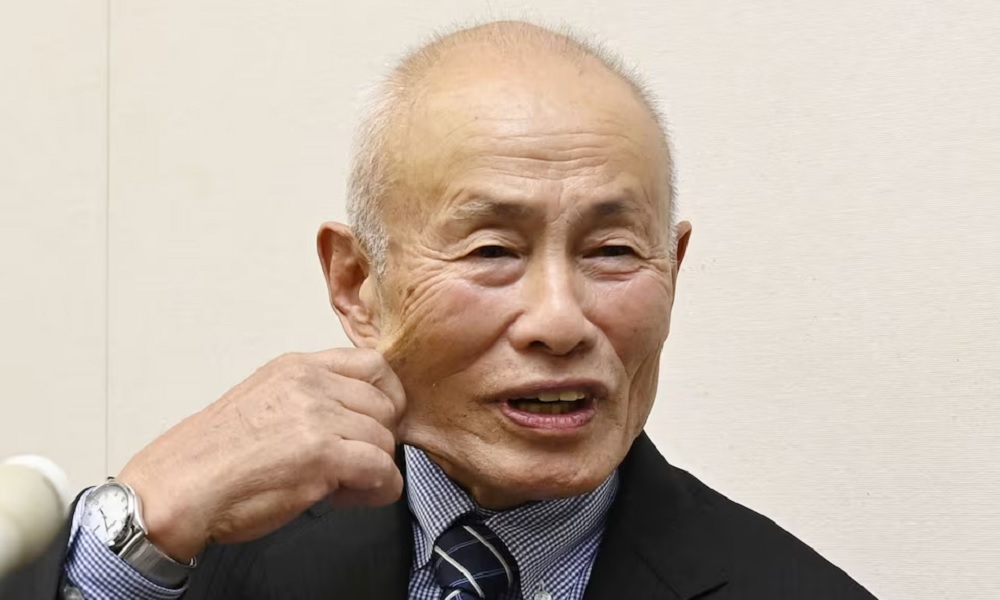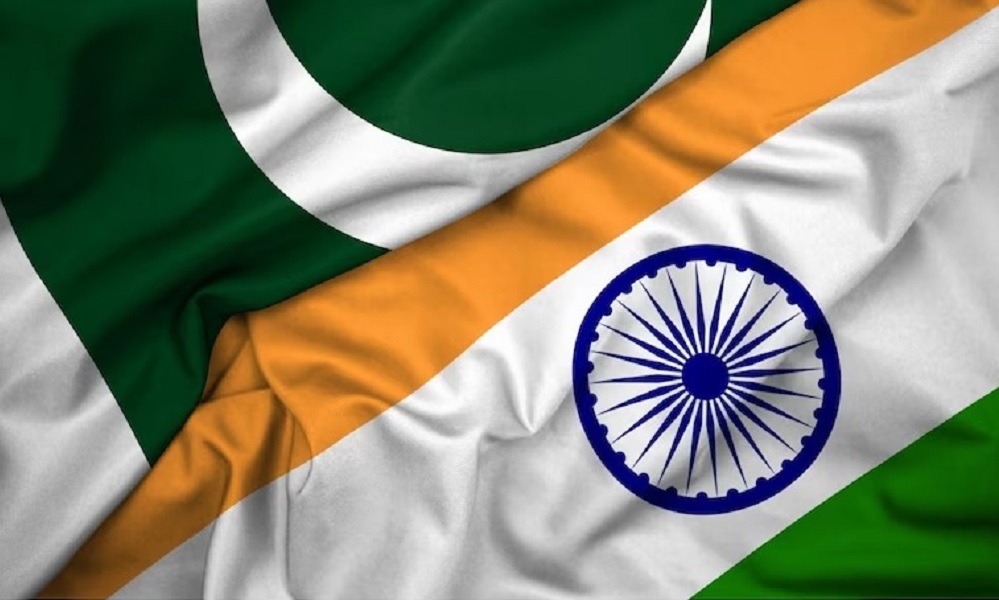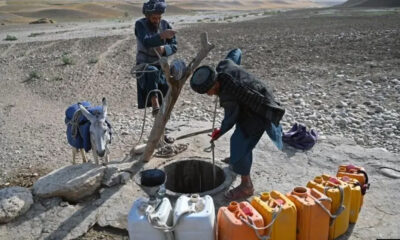World
Japan’s Nihon Hidankyo wins 2024 Nobel Peace Prize
The Norwegian Nobel Committee said in its citation the group was receiving the Peace Prize for “its efforts to achieve a world free of nuclear weapons and for demonstrating through witness testimony that nuclear weapons must never be used again.”

Japanese organisation Nihon Hidankyo, a grassroots movement of atomic bomb survivors from Hiroshima and Nagasaki, won the Nobel Peace Prize on Friday, in a warning to countries that have nuclear weapons not to use them.
Many survivors of the only two nuclear bombs ever to be used in conflict, who are known in Japanese as “hibakusha”, have dedicated their lives to the struggle for a nuclear-free world.
The Norwegian Nobel Committee said in its citation the group was receiving the Peace Prize for “its efforts to achieve a world free of nuclear weapons and for demonstrating through witness testimony that nuclear weapons must never be used again.”
“The hibakusha help us to describe the indescribable, to think the unthinkable, and to somehow grasp the incomprehensible pain and suffering caused by nuclear weapons,” the committee said, Reuters reported.
“I can’t believe it’s real,” Nihon Hidankyo co-chair Toshiyuki Mimaki told a press conference in Hiroshima, site of the Aug. 6, 1945 atomic bombing during the closing stages of World War Two, as he held back tears and pinched his cheek.
Mimaki, a survivor himself, said the award would give a major boost to its efforts to demonstrate that the abolition of nuclear weapons was necessary and possible and faulted governments for waging wars even as their citizens yearned for peace.
“(The win) will be a great force to appeal to the world that the abolition of nuclear weapons and everlasting peace can be achieved,” he said. “Nuclear weapons should absolutely be abolished.”
In Japan, hibakusha, many of whom carried visible wounds from radiation burns or developed radiation-related diseases such as leukaemia, were often forcibly segregated from society and faced discrimination when seeking employment or marriage in the years following the war.
“They are a group of people delivering the message to the world, so as a Japanese I think this is truly wonderful,” Tokyo resident Yoshiko Watanabe told Reuters, as she wept openly in the street.
There were 106,825 atomic bomb survivors registered in Japan as of March this year, data from the country’s health ministry showed, with an average age of 85.6 years.
WARNING TO NUCLEAR NATIONS
Without naming specific countries, Joergen Watne Frydnes, chair of the Norwegian Nobel Committee, warned that nuclear nations should not contemplate using atomic weapons.
“In a world ridden (with) conflicts, where nuclear weapons is definitely part of it, we wanted to highlight the importance of strengthening the nuclear taboo, the international norm, against the use of nuclear weapons,” Frydnes told Reuters.
“We see it as very alarming that the nuclear taboo … is being reduced by threatening, but also how the situation in the world where the nuclear powers are modernising and upgrading their arsenals.”
Frydnes said the world should listen to the “painful and dramatic stories of the hibakusha”.
“These weapons should never be used again anywhere in the world … Nuclear war could mean the end of humanity, (the) end of our civilisation,” he said in an interview.
Russian President Vladimir Putin has repeatedly warned the West of potential nuclear consequences since Russia’s 2022 full-scale invasion of Ukraine.
He declared last month that Russia could use nuclear weapons if it was struck with conventional missiles, and that Moscow would consider any assault on it supported by a nuclear power to be a joint attack.
This month, North Korean leader Kim Jong Un said his country would speed up steps towards becoming a military superpower with nuclear weapons and would not rule out using them if it came under enemy attack, while widening conflict in the Middle East has prompted some experts to speculate Iran may restart its efforts to acquire a nuclear bomb.
SECOND JAPANESE WINNER
Next year will mark the 80th anniversary of the dropping of nuclear bombs by the United States on Hiroshima and Nagasaki in August of 1945 that forced Japan’s surrender.
With the award, the committee was drawing attention to a “very dangerous situation” in the world, according to Dan Smith, head of the Stockholm International Peace Research Institute.
“If there is a military conflict, there is a risk of it escalating to nuclear weapons … They (Nihon Hidankyo) are really an important voice to remind us about the destructive nature of nuclear weapons,” he told Reuters.
Smith said the Committee had achieved “a triple strike”: drawing attention to the human suffering of nuclear bomb survivors; the danger of nuclear weapons; and that the world has survived without their use for nearly 80 years.
The award body has regularly put focus on the issue of nuclear weapons, most recently with its award to ICAN, the International Campaign to Abolish Nuclear Weapons, who won the award in 2017.
This year’s award also echoes those to Elie Wiesel in 1986 and Russia’s Memorial in 2022 by highlighting the importance of keeping the memory of horrific events alive as a warning to the future.
It is the second Nobel Peace Prize for a Japanese recipient in the prize’s 123-year history, 50 years after former Prime Minister Eisaku Sato won it in 1974.
The Nobel Peace Prize, worth 11 million Swedish crowns, or about $1 million, is due to be presented in Oslo on Dec. 10, the anniversary of the death of Swedish industrialist Alfred Nobel, who founded the awards in his 1895 will.
World
Hamas in talks with US about Gaza ceasefire and aid, says senior Palestinian official
The U.S. had previously held discussions with the Palestinian militant group on securing the release of U.S. hostages held in Gaza, read the report.

Talks between Hamas and the U.S. administration on a ceasefire in Gaza and the entry of humanitarian aid to the besieged enclave are underway, a senior Palestinian official familiar with the discussions told Reuters on Sunday.
U.S. President Donald Trump recently repeated a pledge to help get food to Palestinians in Gaza. A U.S.-backed mechanism for getting aid into Gaza should take effect soon, Washington’s envoy to Israel also said on Friday.
A State Department spokesperson said: “We cannot speak to ongoing negotiations, but I will note recent statements by Qatar and Egypt that they are continuing to engage in pursuit of an agreement.”
The spokesperson said that Hamas bore sole responsibility for the war as well as for the resumption of hostilities.
“President Trump has made clear the consequences Hamas will face if it continues to hold the hostages, including American Edan Alexander and the bodies of four Americans,” the spokesperson added.
The U.S. had previously held discussions with the Palestinian militant group on securing the release of U.S. hostages held in Gaza, read the report.
Israeli media reported on Sunday that Prime Minister Benjamin Netanyahu had told a closed session of the Foreign Affairs and Defense Committee that Hamas could soon release Alexander, an American-Israeli hostage, as a goodwill gesture towards Trump, who will visit this Middle East this week.
The prime minister’s office did not immediately respond to a request for comment on the reports.
Since March 2, Israel has cut off all supplies to the 2.3 million residents of Gaza, and food stockpiled during a ceasefire at the start of the year has all but run out.
On March 18, Israel effectively ended the January ceasefire agreement with Hamas and renewed its military campaign in Gaza, Reuters reported.
Hamas has said it is willing to free all remaining hostages seized by its gunmen in attacks on communities in southern Israel on October 7, 2023, and agree to a permanent ceasefire if Israel pulls out completely from Gaza.
Israel, vowing the war can only stop once Hamas is stamped out, has said it plans to expand its military campaign in Gaza, which has been devastated during the war and prompted warnings from the U.N. that the population faces imminent famine.
The October 2023 Hamas attacks killed 1,200 people, and 251 were taken hostage back to Gaza, according to Israeli tallies. Israel’s campaign has killed more than 52,800 Palestinians, mostly civilians, according to Hamas-run health authorities.
World
Trump says India, Pakistan agree to ‘full and immediate ceasefire’

U.S. President Donald Trump said on Saturday that India and Pakistan had agreed to a “full and immediate ceasefire” after a fourth day of strikes and counter-strikes against each other’s military installations.
Pakistan’s foreign minister also said both countries had agreed to a ceasefire “with immediate effect” and India’s foreign ministry said it would start at 5 p.m. Indian time (1130 GMT).
“After a long night of talks mediated by the United States, I am pleased to announce that India and Pakistan have agreed to a FULL AND IMMEDIATE CEASEFIRE. Congratulations to both Countries on using Common Sense and Great Intelligence,” Trump said in a post on Truth Social.
The sudden announcement came on a day when fears spiked that the countries’ nuclear arsenals might come into play as Pakistan’s military said a top military and civilian body overseeing its nuclear weapons would meet.
But Pakistan’s defence minister later said no such meeting was scheduled.
At the same time, officials from both sides showed a willingness to take a step back following the day’s exchanges, as the combined civilian death toll on the two sides rose to 66.
“Pakistan and India have agreed to a ceasefire with immediate effect,” Pakistani Foreign minister Ishaq Dar posted on X. “Pakistan has always strived for peace and security in the region, without compromising on its sovereignty and territorial integrity!”
India’s foreign ministry said that the head of Pakistan’s military operations called his Indian counterpart on Saturday afternoon and it was agreed that both sides would stop all firing.
The two heads will speak to each other again on May 12, the ministry added.
The fighting began on Wednesday when India carried out strikes on what it said was “terrorist infrastructure” in Pakistani Kashmir and Pakistan, two weeks after 26 people were killed in an attack on Hindu tourists in Indian Kashmir.
Pakistan denied India’s accusations that it was involved in the tourist attack. Since Wednesday, the two countries have exchanged cross-border fire and shelling, and sent drones and missiles into each other’s airspace.
The countries have been locked in a dispute over Kashmir since they were born after the end of British colonial rule in 1947. Hindu-majority India and Islamic Pakistan both claim Kashmir in full but rule it in part.
They have gone to war three times since, including twice over Kashmir, and clashed several times.
India blames Pakistan for an insurgency in its part of Kashmir that began in 1989 and has killed tens of thousands. It also blames Pakistani Islamist militant groups for attacks elsewhere in India.
Pakistan rejects both charges. It says it only provides moral, political and diplomatic support to Kashmiri separatists.
(Reuters)
World
US offers to help India and Pakistan start talks, G7 also urges dialogue

The U.S. government said it offered assistance to make India and Pakistan start “constructive talks” while the Group of Seven (G7) major countries also urged the Asian neighbors to engage in direct dialogue amid heightened hostilities.
World powers have raised the alarm over the latest escalation in the decades-old India-Pakistan rivalry. India hit Pakistan with air strikes and missiles on Wednesday and since then the nuclear-armed countries have been clashing daily while launching strikes against each other’s military installations on Saturday. Dozens have been killed.
The U.S., especially Secretary of State Marco Rubio, has held regular talks with both India and Pakistan since late April and urged them to de-escalate.
The U.S. State Department late on Friday and early Saturday released three statements on Rubio’s calls with Pakistan Army Chief Asim Munir, and the foreign ministers of India and Pakistan.
It said Rubio urged them to “re-establish direct communication to avoid miscalculation” while offering U.S. assistance “in starting constructive talks” to avoid future conflicts.
Michael Kugelman, a Washington-based South Asia analyst and writer for the Foreign Policy magazine, said Rubio’s decision to call the army chief directly was “the most consequential move the U.S. has made” since the start of the crisis:
“If you want to talk to the Pakistanis about de-escalation, you need to talk to General Munir.”
President Donald Trump said earlier this week the rising tensions were a shame. U.S. Vice President JD Vance said a war would be “none of our business.”
In recent years, India has been seen as a partner by Western powers to counter China’s rising influence. Pakistan is a U.S. ally although its importance has diminished since Washington’s 2021 withdrawal from neighboring Afghanistan.
In a G7 statement, the foreign ministers of Canada, France, Germany, Italy, Japan, the U.S., Britain and the European Union said they “strongly condemn” an April 22 Islamist militant attack in which 26 people were killed in India-administered Kashmir. India blamed Pakistan, which denied the accusations and called for a neutral probe.
“We call for immediate de-escalation and encourage both countries to engage in direct dialogue towards a peaceful outcome,” the G7 top diplomats said.
Muslim-majority Kashmir is claimed in full but ruled only in part by both Hindu-majority India and Islamic Pakistan and has seen wars, insurgency and diplomatic stand-offs over the decades.
(Reuters)
-

 Regional5 days ago
Regional5 days agoIndia dismisses report of Pakistan downing jets as “disinformation”
-

 Sport4 days ago
Sport4 days agoAriana Television to broadcast 4th edition of Afghanistan Futsal Premier League
-

 Latest News4 days ago
Latest News4 days agoTAPI pipeline to reach Herat by end of 2025: Ministry
-

 Latest News4 days ago
Latest News4 days agoNearly one-third grapple with hunger in Afghanistan: WFP
-

 Sport4 days ago
Sport4 days agoIPL 2025: Dharamsala match abandoned due to security concerns
-

 Latest News5 days ago
Latest News5 days agoUzbekistan, Poland discuss cooperation over Afghanistan
-

 Regional4 days ago
Regional4 days agoIndia says military stations attacked by Pakistan drones and missiles
-

 Latest News4 days ago
Latest News4 days agoOne dead, dozens injured as powerful storm strikes Jalalabad, Afghanistan
























